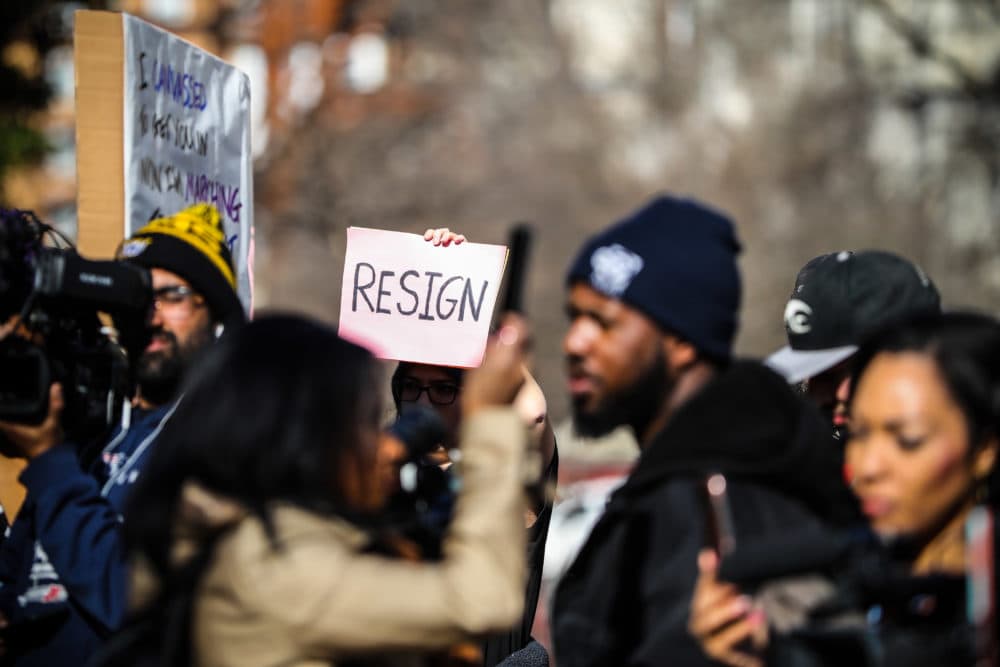Advertisement
These Virginians Say The State's Blackface Controversy Is Disappointing But Not Surprising

Virginians are still wondering what’s going to happen to the state’s top leaders. Two of them — Democratic Gov. Ralph Northam and Democratic Attorney General Mark Herring — have been engulfed in scandal after admitting to dressing in blackface decades ago.
Meanwhile, Democratic Lt. Gov. Justin Fairfax is facing sexual assault allegations.
None has resigned.
Along with political questions, there's shock in and out of Virginia about the politicians' actions. Ed Ayers (@edward_l_ayers), a historian and former president of the University of Richmond, says the role of blackface in the controversy is "disheartening," but not surprising.
"As a historian of the United States, it's not surprising because this has been one of the most popular forms of white people entertaining one another for generations in this country," he tells Here & Now's Jeremy Hobson.
Audio engineer and musician Jamal Millner says he shares that view.
Millner played in bands while he was in college at the University of Virginia in the early 1990s, mostly at fraternity parties, where he says he was frequently one of the only African-Americans in the room.
"There would be more than one occasion a year where there would be a costume-type function. Obviously Halloween, but sometimes, there would be other functions throughout the year. And basically, what would happen, at least one person would have blackface, maybe an Afro wig with that, or blackface with a dreadlock wig and hat," he says.
Millner says Northam should have apologized right away after the racist photo from Northam’s medical school yearbook emerged. But after the governor's denial, "he definitely lost my support," Millner says.
Ayers says that while Virginia has seen rapid change in an effort to transition out of its racially controversial past, the recent revelations involving the governor and others are "especially heartbreaking."
Advertisement
Interview Highlights
On the history of blackface
Ed Ayers: "In the 1930s, '40s and '50s, minstrelsy — which was very often white men corking up to pretend to be black or exaggerated versions of African-Americans — was one of the most best guarantees of pulling in a large audience. And then, after that kind of fades in the late 19th century, [blackface] becomes sort of a folk art among white people, who are getting together in places where they completely control things. You'd find all kinds of, you know, civic clubs that would have an annual event that they would dress up in blackface. … So you would have found this in the same way the Ku Klux Klan in the 1920s was very popular in many parts of the United States far outside the South. So you would've found this kind of 'blacking up' very common through a lot of the 20th century. … You know, by that time [1980s], I'm a college professor and I couldn't have imagined that this would have been the case."
Jamal Millner: "As a musician between like 1989 and about 1996, traveling throughout the entire South … I observed [blackface] also at other Southern universities — University of Alabama, Auburn, University of South Carolina. So it wasn't, at white fraternities, unusual for at least someone during a Halloween or a costume party to dress as an African-American."
On looking back at witnessing blackface in the '80s and '90s
Millner: "I'm looking at it now reflectively. I didn't like it but I didn't say anything to them because it's often, like I said, I was probably the only black person in the building that ... maybe wasn’t one of their employees. I thought they were making fun of black people at large, not me specifically. They didn't know that I would be there probably.
"I think unfortunately this is going to be similar to the #MeToo [movement], that there are going to be lots of people who were at parties or who did these things. And usually, unfortunately, fraternities are the gateway to power. So these will be people in positions in our government or corporations."
On what this situation drags up for people in Virginia and across the South
Ayers: "Well as people may know, Virginia has been led by Democratic governors and senators and recently presidential electors for a while, and people have thought that Virginia is seceding from the South in some ways, you know. … So there's been a kind of amnesia in Virginia that we've forgotten that we were the largest state for enslaved population and that we had this history of segregation and massive resistance. So you know, like Jamal, I think those of us who think about this for a living ... are not necessarily surprised but we're very disheartened. The people who have been caught up in this seem to be leading us in such a healthy direction and actually confronting issues of race in a way that has not been the Virginia way."
On what might happen next in Virginia
Ayers: "What strikes me beyond the personalities involved is that [it] was widely expected that Virginia was getting ready to turn Democratic throughout the general assembly as well. So on the national level, it's been there for a while. But what was it going to mean for things like the debates over Confederate memorials and all that, when the Democrats control the entire general assembly? So I think the interesting question is going to be, what are the reverberations of this for the future of the entire commonwealth politically?"
Cassady Rosenblum produced and edited this interview for broadcast with Todd Mundt. Serena McMahon adapted it for the web.
This segment aired on February 7, 2019.
